DAFs: Black Box or Magic Bullet?
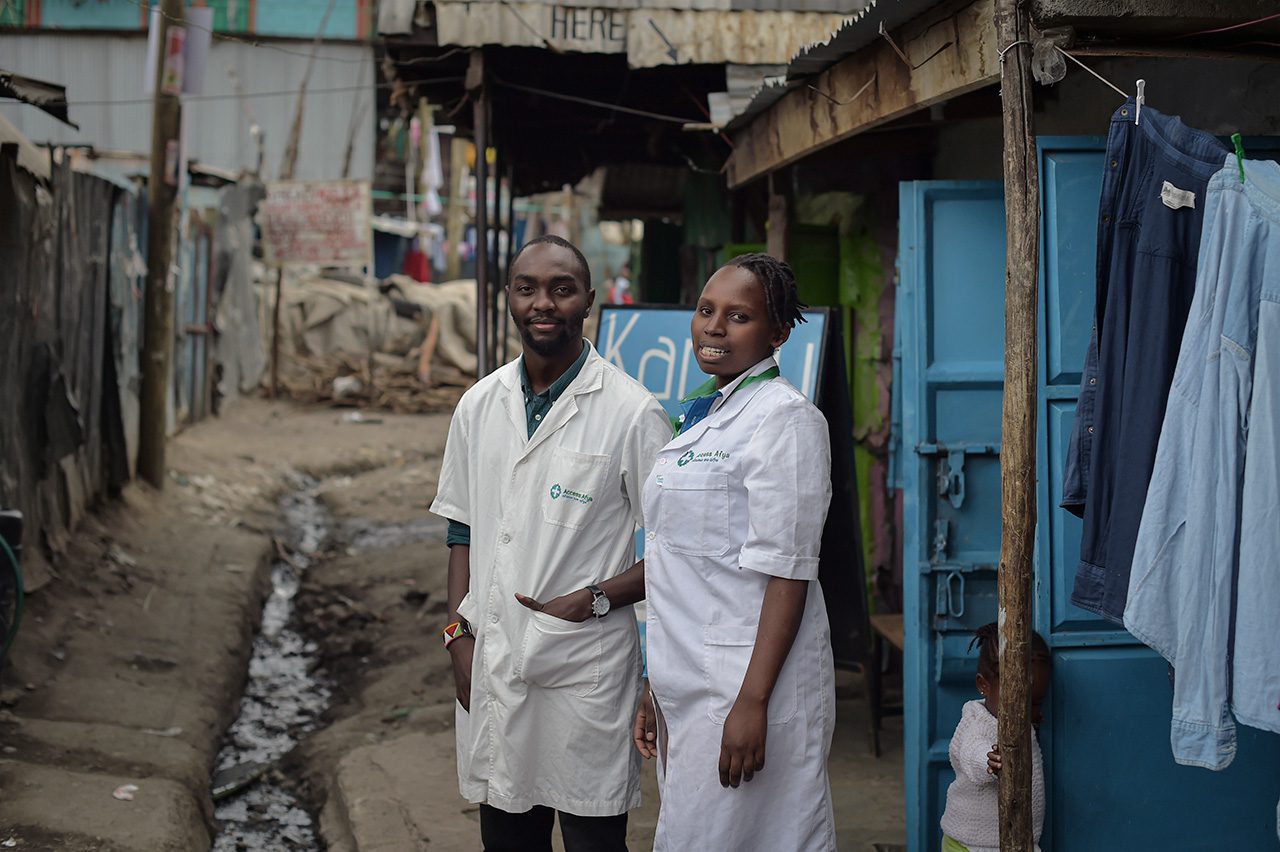
Committed to improving healthcare standards, Access Afya collaborates with local non physician health workers in Nairobi to integrate ChatGPT into their healthcare services.
In an era marked by unprecedented technological advancement, the intersection of artificial intelligence (AI) and social impact presents extraordinary opportunities for positive change. AI-driven solutions are improving efficiency, optimizing resource allocation, fostering the development of innovative products, and facilitating better decision-making. Its ability to mimic human intelligence and automate tasks holds immense promise for social entrepreneurs seeking scalable solutions. However, the integration of AI into business operations also brings risks and challenges such as energy consumption, job displacement, data privacy, and algorithmic bias concerns, underscoring the importance of responsible implementation and ongoing ethical scrutiny.
Many of Miller Center’s social enterprise alumni have completed their due diligence and are already taking advantage of AI’s ability to transform their organizational processes, while others are further evaluating the possibilities and obstacles associated with the technology before making the leap.
Imagine a world where healthcare is not constrained by geography or resources, where rural communities have access to quality medical expertise at their fingertips. This vision is becoming a reality through the innovative use of AI in healthcare operating systems.
According to a study by the National Institutes of Health, a growing number of health clinics in Africa are operating below acceptable standards, particularly in low-income neighborhoods where healthcare infrastructure is limited. Access Afya, which translates to “access health” in Swahili, is keenly aware of this challenge. The healthcare enterprise has undertaken an initiative to integrate ChatGPT into their operating system to enable immediate responses and personal guidance for patients, community health workers, and clinicians seeking medical advice.
Yet, the decision to incorporate AI-powered chatbots into their operations was not made without careful consideration. To better understand the concerns and expectations regarding the use of AI in healthcare, Access Afya assembled a multidisciplinary team of experts from various fields, including a team from Savannah Informatics and the University of Nairobi Center for Healthcare Quality and Innovation, to thoroughly assess the benefits and risks. They also conducted numerous validation exercises, engaging directly with their target audience — patients, community health workers, and doctors — to create a customized model tailored to their customers’ needs. This model was supported by a robust framework of real-time performance metrics, enabling their managers to implement data-driven adjustments instantaneously.
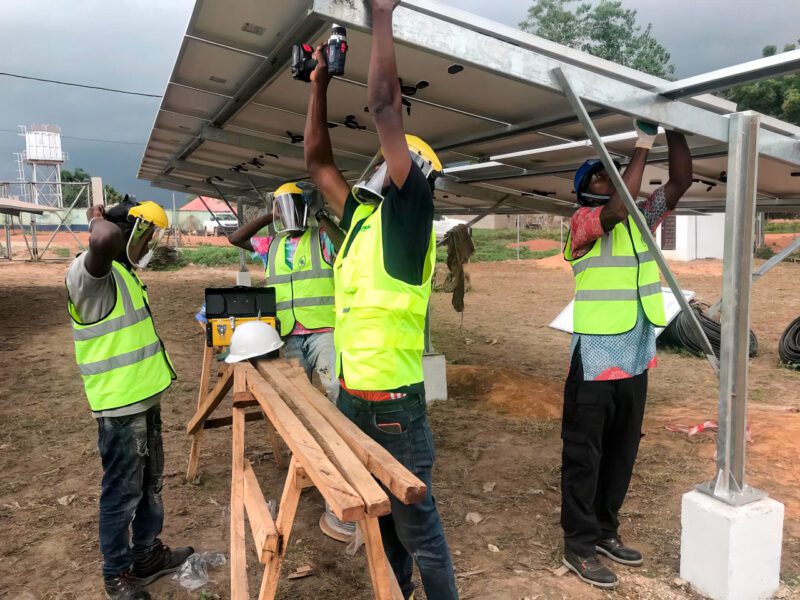
By employing predictive AI to electrify off-grid communities, Husk’s innovative solutions not only foster economic growth but also aim to serve tens of millions of people and businesses in the world’s most climate-vulnerable regions, especially Sub-Saharan Africa.
Similarly, AI is proving to be a game-changer in the quest to eradicate energy poverty. Companies like Husk Power Systems are leveraging AI to scale energy access in rural and peri-urban areas, reaching previously unserved communities with reliable and sustainable power. By automating monitoring and management tasks, Husk is able to use predictive AI to anticipate supply and demand, ensuring electricity is delivered to customers more efficiently and at lower cost. This transformative technology is not only improving livelihoods but also paving the way for economic growth and social development in some of the world’s most marginalized and climate-vulnerable regions.
Husk, which has around 300 minigrids operating in India and Nigeria, is also using AI-powered solutions to fast-track climate-resilient economic growth with its groundbreaking initiative, Africa Sunshot. Husk aims to establish 2,500 net-zero minigrids within off-grid and weak-grid communities in Africa over the next five years. The ambitious target will help address Africa’s pressing need for energy, where the current electrification rate stands at a mere 36% in the least developed countries, by connecting at least 8 million people. “AI is the only way to automate operations and get to the scale needed to eradicate energy poverty in the shortest time possible,” said Manoj Sinha, the company’s CEO and cofounder.
While the possibilities are immense, addressing the challenges and ethical considerations that accompany AI technology is essential. From environmental demands and workforce restructuring concerns to data confidentiality issues and biases in algorithms, ensuring equity and accountability must remain paramount. “Humans can use or misuse tools,” said Eric Haynie, manager of Instructional Technology at Santa Clara University and a religious studies lecturer of Buddhism. “We made metal implements a long time ago. They can be weapons, or they can be tools.”
Evolving technologies will continue to reshape the landscape of AI-driven social entrepreneurship and pave the way for greater transparency, accountability, and inclusivity.
The environmental impact of using Large Language Models (LLMs) is significant due to their high energy and water demands for training and operation. The University of Massachusetts Amherst reports that training a single AI model can produce carbon emissions equivalent to the lifetime emissions of five average American cars. Researchers are optimistic that ongoing advancements in these technologies and methods could soon lead to a drop in energy intensity and pave the way for more sustainable practices.
The potential for AI to disrupt traditional employment models raises legitimate concerns about job displacement, particularly in rural regions where alternative employment opportunities are scarce. Dr. Daphne Ngunjiri, CEO of Access Afya, remarked, “The development of AI will far outpace the development of job creation opportunities. In parts of the world like ours, we must be very intentional to not be caught on the back foot. It’s my personal belief that businesses and policymakers should prioritize innovations that either preserve or create new employment opportunities and mitigate the introduction of technologies that could lead to job losses.”
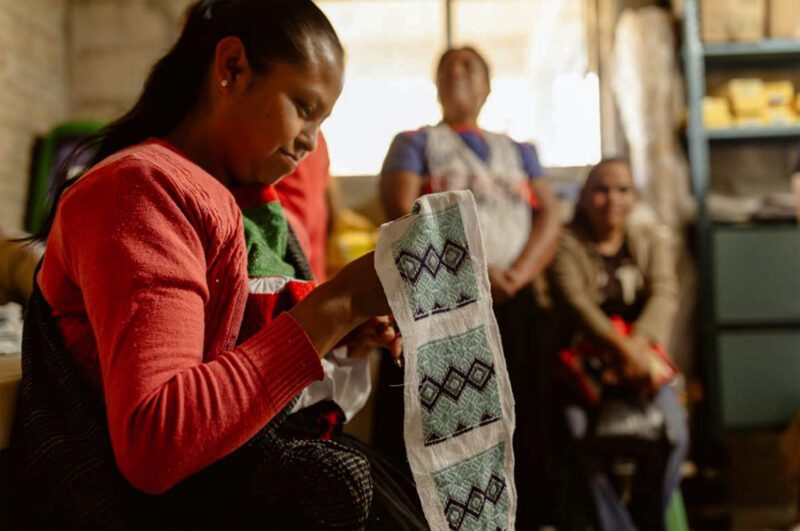
Someone Somewhere seamlessly integrates AI-powered design with traditional Mexican craftmanship to create intricate patterns, preserving cultural heritage and empowering local artisans.
Organizations like Someone Somewhere, a social enterprise lifestyle brand in Mexico, are recognizing the importance of balancing technological innovation with social responsibility. Through collaborative AI — integrating AI with human cognition — Someone Somewhere combines its database of artisanal techniques and sustainable materials with AI-powered design tools to show artisans what they can achieve at unprecedented speed. By augmenting rather than replacing human labor, the technology enables social entrepreneurs to enhance efficiency while preserving job opportunities and fostering economic empowerment. The integration of AI into product creation presents a significant opportunity for Someone Somewhere to drive innovation, maintain competitiveness, and deliver superior products into a dynamic market.
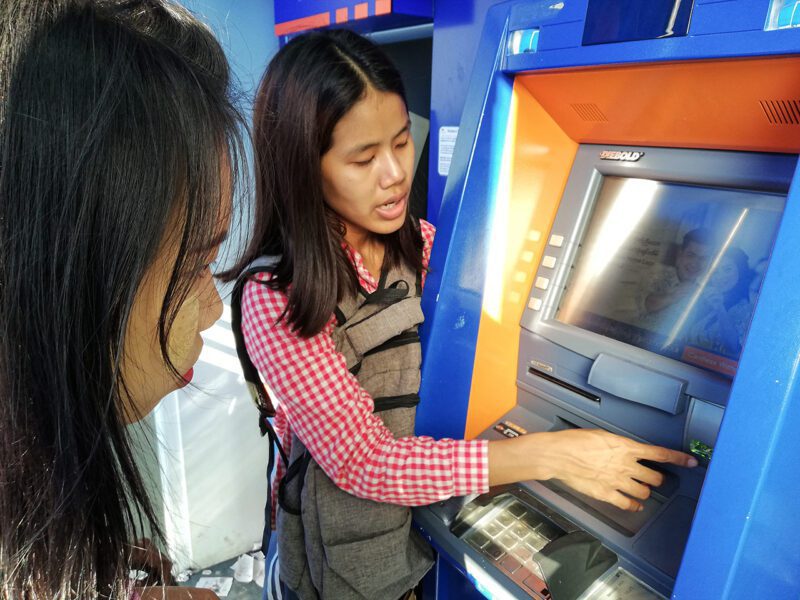
With a women-centric approach, ONOW is committed to enhancing economic empowerment and social inclusion in Myanmar, ensuring data privacy and security through responsible AI use.
Safeguarding data privacy and security is also paramount in this age of AI-driven social entrepreneurship. ONOW, an entrepreneurship development system that empowers female entrepreneurs in Myanmar, uses AI-driven business training to foster economic empowerment and social inclusion. Their design approaches are women-centric, and as they collect and analyze vast amounts of sensitive information, they are committed to upholding the principles of responsible AI use by prioritizing privacy and ensuring informed consent in their operations. The ethical implications of AI also extend to the issues of bias. AI algorithms, trained on biased datasets, may exacerbate existing disparities, particularly in critical domains such as healthcare.
Michelle Bushneff, founder of BIGthinskter Lab and an AI consultant, remarked, “A lot of society’s biases have been built into AI, but unlike society, AI can correct these biases a lot faster.” To help mitigate these risks, Access Afya has enlisted an independent researcher to provide an impartial assessment of ChatGPT’s performance. Other social enterprises should take note to adopt similar practices, ensuring that AI systems prioritize fairness, accountability, and social justice.
The potential of AI seemingly knows no bounds, touching everything from collaborative initiatives to ethical frameworks. Nevertheless, embracing this future requires a cautiously optimistic approach toward the promise of AI for good, coupled with smart due diligence to carefully weigh the pros and cons of potential applications. Matt Wallace, cofounder of ONOW, offers some guidance to fellow entrepreneurs, “Embrace AI, but do it bit by bit. Rather than allocating substantial amounts of money to an AI product team, invest in one or two in-house developers with applied AI engineering capacity to explore the best avenues for leveraging AI to scale your operations.”
Evolving technologies will continue to reshape the landscape of AI-driven social entrepreneurship and pave the way for greater transparency, accountability, and inclusivity. Through responsible use and interdisciplinary collaboration, there is an opportunity for social entrepreneurs to harness AI’s potential to drive positive change on a global scale.
Related Content
Comments
Deep Dives
RECENT
Editor's Picks
Webinars
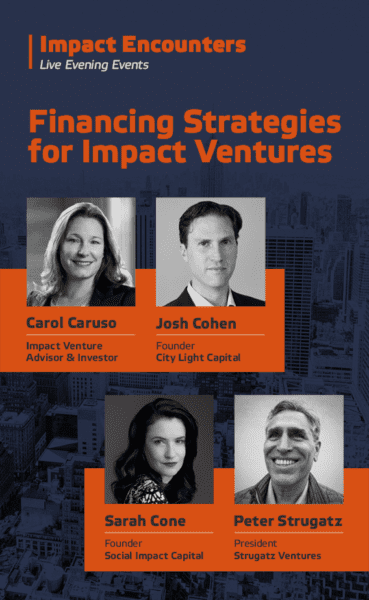
Impact Encounters
May 22 - 6:30 PM EST

Featuring
Courtney Birnbaum
Director of Sustainability, Corbin Capital
May 30 - 12:00 PM EST
News & Events
Subscribe to our newsletter to receive updates about new Magazine content and upcoming webinars, deep dives, and events.
Become a Premium Member to access the full library of webinars and deep dives, exclusive membership portal, member directory, message board, and curated live chats.
0 Comments